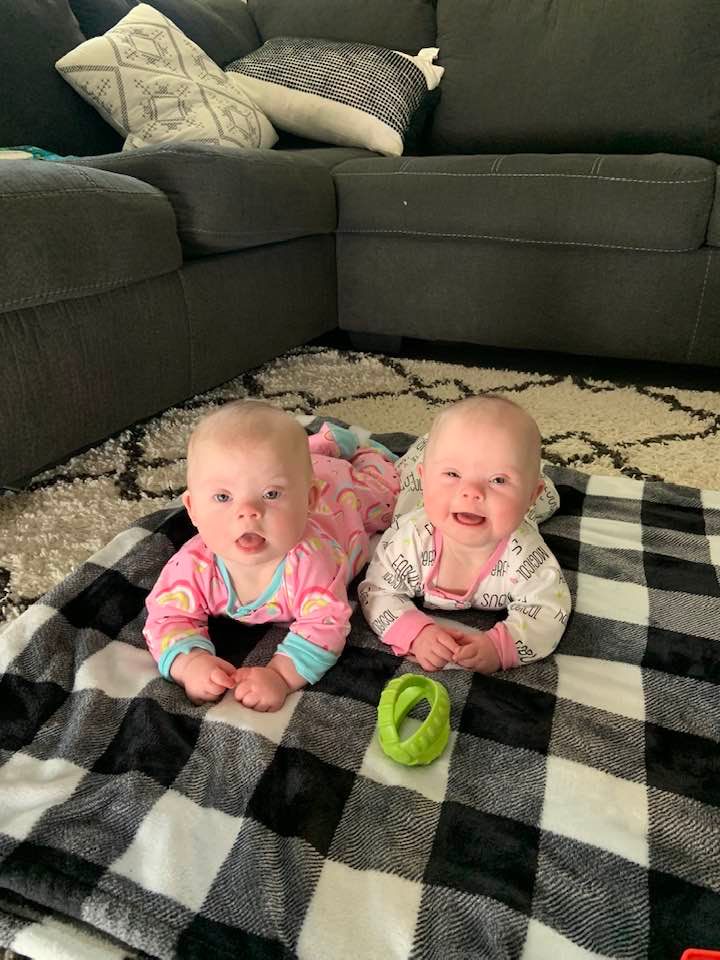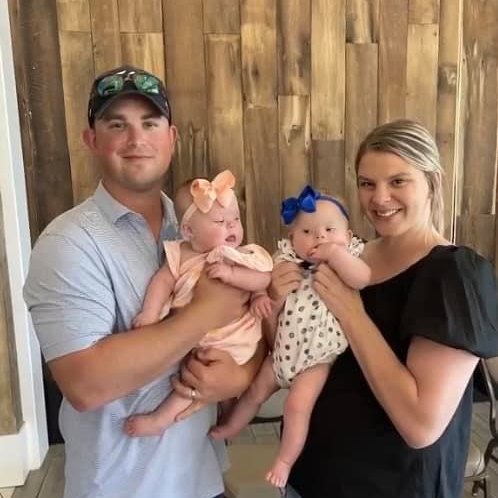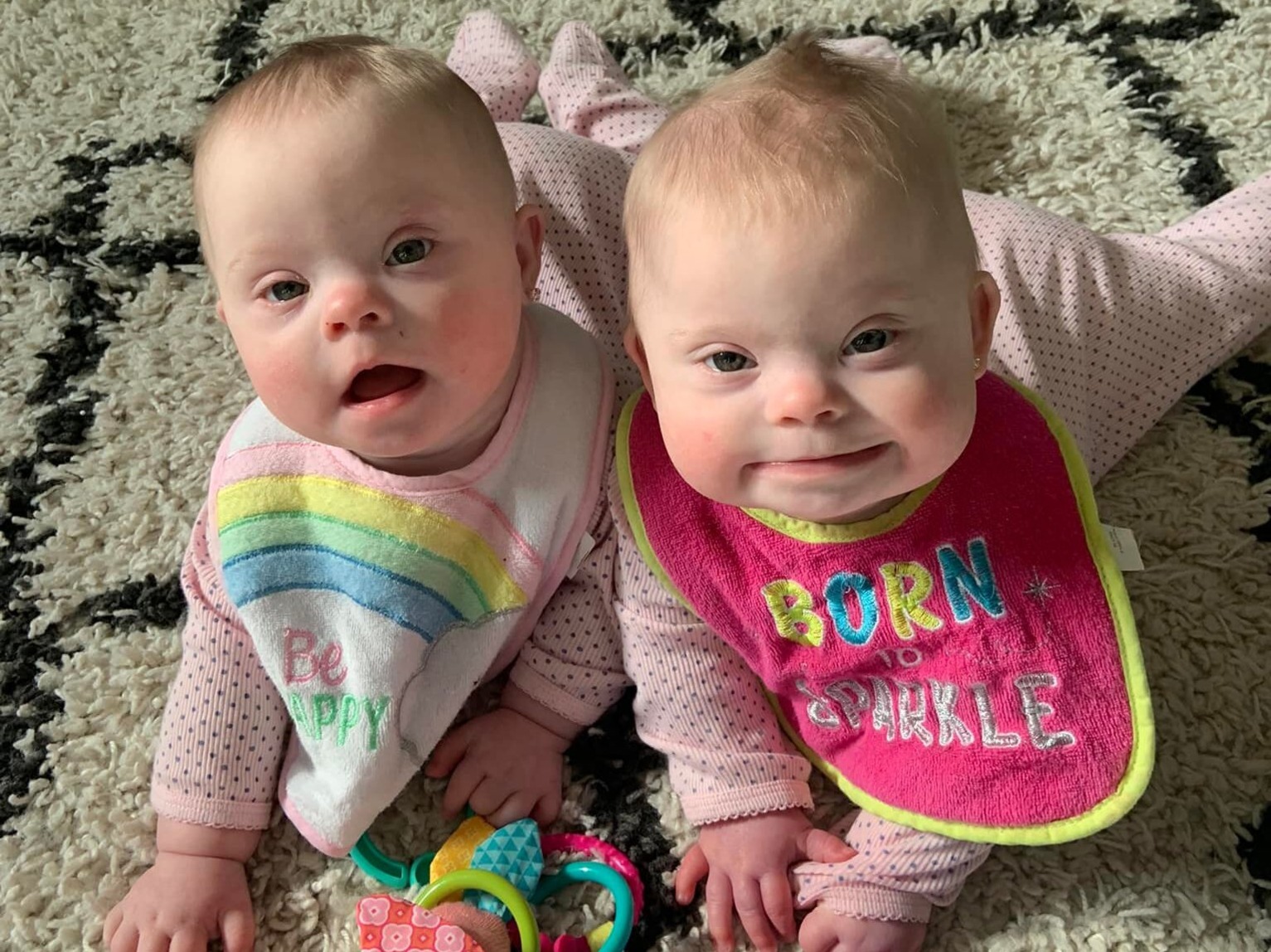When Savannah Combs learned she was expecting twins at 23, she was overcome with joy. The Florida mother had no idea, however, that her pregnancy would place her in a group so rare it’s estimated at roughly one in two million. Her daughters, identical twin girls Kennadi Rue and Mckenli Ackerman, were both born with Down syndrome,a condition occurring in about 1 in every 700 births. But the combination of identical twins and Down syndrome? Nearly unheard of.
For Savannah and her husband, Justin Ackerman, the diagnosis was emotional. But rather than allow fear or stigma to shape their response, the couple chose faith, love, and transparency. Now, through viral TikTok videos and open-hearted storytelling, Savannah is sharing her daughters’ journey,celebrating their lives while gently pushing back against a world that still too often misunderstands what it means to raise a child with Down syndrome.
A Rare Pregnancy,and a Rarer Diagnosis
Statistically, twin births are relatively uncommon. While twin birth rates increased by 72% between 1980 and 2018, only about 33 in every 1,000 births are twins. Identical twins, or “monozygotic” twins, make up an even smaller fraction,just 3 or 4 out of every 1,000 births.
Savannah’s pregnancy stood out even more. Her daughters were diagnosed as mono-di twins, a rare type in which each fetus develops in its own amniotic sac, but both share a single placenta. This already-rare circumstance became even more exceptional when both girls were diagnosed with Down syndrome during prenatal testing.
“It’s very rare what they have, but they’ve been my little gems,” Savannah told News4JAX. “Mono-di twins are already rare. Then you throw Down syndrome on top of it,it’s like one in two million.”

Facing the Diagnosis with Courage
Receiving the diagnosis was emotional. Savannah was met not only with the usual nerves of a high-risk pregnancy, but also outside pressures that included suggestions to terminate.
She was told the babies might not survive. But she resisted the fear. “Every [prenatal] appointment they were alive was a blessing to me,” she said.
At the time, her husband Justin was away at military boot camp. Savannah found herself walking the early stages of the journey alone. Then, at 29 weeks, she went into labor. On May 12, 2021, Kennadi and Mckenli were born prematurely, weighing just a few pounds each. They would spend several weeks in the NICU before going home.
Despite their early arrival and diagnosis, Savannah was filled with gratitude. “They have feelings. They have a beating heart. They know how to communicate. They’ll get there,it may be a step behind, but they’re going to do it,” she explained.
Raising Awareness Through Social Media
Savannah, who lives in Middleburg, Florida, turned to TikTok not just as an outlet, but as a platform for education and encouragement. Her videos,featuring her daughters’ daily milestones and smiles,quickly gained traction. Millions of views later, Savannah had cultivated a supportive online community inspired by her authenticity and love.
One recurring message in her posts is simple but powerful: Her daughters are just like any other children.
“I’m going to teach them that they’re just like everyone else,” she said in one video. “They can achieve anything they put their minds to.”
Whether celebrating Kennadi learning to sit up or Mckenli babbling her first words, Savannah documents each moment as proof that her girls are full of potential and personality,just like any other toddlers.
Responding to Cruelty with Grace
Alongside support, Savannah has also encountered judgment. Social media, for all its positives, can be a harsh space,especially for mothers who share vulnerable truths. She’s received comments questioning why she didn’t give the babies up for adoption or terminate the pregnancy altogether.
One especially harsh message read: “I wouldn’t want those babies; if mine came out like that, they’d be put up for adoption.”
Savannah responded not with anger, but quiet conviction. In a Facebook post, she wrote:
“Good thing they weren’t born to you and were born to me. God knew what He was doing by giving these babies to the right parents who would love them unconditionally.”
Her grace under pressure has earned her not just followers, but admiration.
Changing the Narrative Around Down Syndrome
Savannah’s story is part of a broader, growing movement led by families of children with disabilities who are reclaiming the narrative. Where outdated stereotypes once painted children with Down syndrome as inherently limited, today’s families,and the growing scientific community around them,know otherwise.
According to the National Down Syndrome Society, early intervention, inclusive education, and supportive family environments are key to developmental success. Many individuals with Down syndrome attend school, hold jobs, and lead full, active lives.
Still, stigma persists. Savannah’s candid videos serve as gentle corrections to those outdated views. Her message is clear: Children with Down syndrome are not burdens. They are individuals, full of life, spirit, and worth.
Building a Future, One Milestone at a Time
As Kennadi and Mckenli grow, they continue to defy expectations. From physical development to communication, each milestone is a celebration,not just of the girls’ progress, but of the love and determination that surround them.
“They’re feisty little things and happy little things,” Savannah said. “It may take them a little longer, but they’ll get there.”
For Savannah, raising her daughters is not about managing a diagnosis. It’s about embracing their uniqueness and equipping them with confidence. She’s already thinking about how she’ll guide them through life’s challenges,not shielding them, but preparing them.

A Message for Other Parents
Savannah doesn’t claim to have all the answers. But her story has resonated with thousands of other parents who have felt the sting of judgment,or the fear of the unknown.
“If I can help even one mom not feel alone, it’s worth it,” she shared.
Her advice to others facing a similar diagnosis? “Let love guide you. Don’t let fear dictate your choices. Every child deserves to be seen, supported, and celebrated for who they are.”
The Power of Perspective
At 23, Savannah was told to give up. That her daughters would never make it. That she should walk away.
Instead, she chose to stay. To love. To fight.
Today, Kennadi and Mckenli are thriving, cherished not in spite of their diagnosis,but fully, joyfully, because of who they are.
And through it all, Savannah continues to share her message with dignity and honesty: every life has value, and love doesn’t count chromosomes.
Featured image from Facebook: Mckenli Kennadi Ackerman

